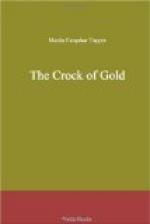No need to struggle with the man, or tear his coat off. Jennings appeared only too glad to find that there was other evidence than his own foul tongue, and that he might be hung at last without sacking-rope or gimlet; so, he quietly bared his arm, and the elbow looked all manner of colours—a mass of old bruises.
CHAPTER XLVII.
MR. SHARP’S ADVOCACY.
THE whole court trembled with excitement: it was deep, still silence; and the judge said,
“Prisoner at the bar, there is now no evidence against you: gentlemen of the jury, of course you will acquit him.”
The foreman: “All agreed, my lord, not guilty.”
“Roger Acton,” said the judge, “to God alone you owe this marvellous, almost miraculous, interposition: you have had many wrongs innocently to endure, and I trust that the right feelings of society will requite you for them in this world, as, if you serve Him, God will in the next. You are honourably acquitted, and may leave this bar.”
In vain the crier shouted, in vain the javelin-men helped the crier, the court was in a tumult of joy; Grace sprang to her father’s neck, and Sir John Vincent, who had been in attendance sitting near the judge all the trial through, came down to him, and shook his hand warmly.
Roger’s eyes ran over, and he could only utter,
“Thank God! thank God! He does better for me than I deserved.” But the court was hushed at last: the jury resworn; certain legal forms and technicalities speedily attended to, as counts of indictment, and so forth: and the judge then quietly said,
“Simon Jennings, stand at that bar.”
He stood there like an image.
“My lurd, I claim to be prisoner’s counsel.”
“Mr. Sharp—the prisoner shall have proper assistance by all means; but I do not see how it will help your case, if you cannot get your client to plead not guilty.”
While Mr. Philip Sharp converses earnestly with the criminal in confidential whispers, I will entertain the sagacious reader with a few admirable lines I have just cut out of a newspaper: they are headed
“SUPPRESSION OF TRUTH AND EXCLUSION OF EVIDENCE.
“Lawyers abhor any short cut to the truth. The pursuit is the thing for their pleasure and profit, and all their rules are framed for making the most of it.
“Crime is to them precisely what the fox is to the sportsman: and the object is not to pounce on it, and capture it at once, but to have a good run for it, and to exhibit skill and address in the chase. Whether the culprit or the fox escape or not, is a matter of indifference, the run being the main thing.
“The punishment of crime is as foreign to the object of lawyers, as the extirpation of the fox is to that of sportsmen. The sportsman, because he hunts the fox, sees in the summary destruction of the fox by the hand of a clown, an offence foul, strange, and unnatural, little short of murder. The lawyer treats crime in the same way: his business is the chase of it; but, that it may exist for the chase, he lays down rules protecting it against surprises and capture by any methods but those of the forensic field.




